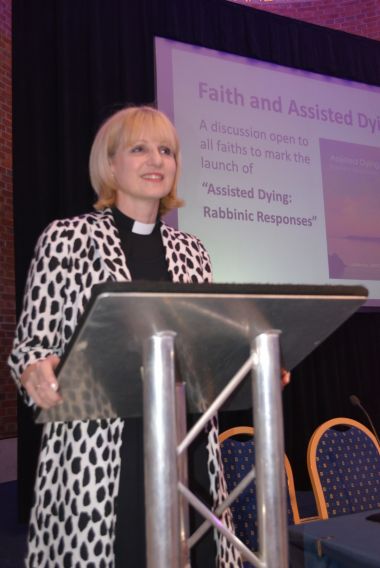Senior CofE priest: Why I am pro assisted dying

A leading woman priest in the Church of England has spoken out in favour changing the law to allow assisted dying.
Canon Rosie Harper, vicar of Great Missenden and chaplain to the Bishop of Buckingham, said she supports Lord Falconer's Assisted Dying Bill which receives its second reading in the House of Lords on July 18.
Her position directly contradicts that of the Church of England, which has argued consistently for no change in the law.
Canon Harper was one of three faith leaders backing the Bill during a debate on the issue hosted by Interfaith Leaders for Dignity in Dying in Westminster, London yesterday.
She described the assisted death of her uncle with Dignitas in Switzerland. "My uncle had a beautiful death, with his family around him - good music, good wine, and a pain-free end. The days that would have followed as he struggled through the end stage of a brain tumour would have been terrible. He had no choice about dying. He did have choice about the manner of his death. That's all this bill is offering."
She said she could not believe in a God who would require "the most extreme suffering" simply in order to shore up "her" sovereignty.
"Nor do I believe that holding on to life at all costs is the uncontested goal of humanity. The crucifixion itself demonstrates that there are higher goals than the preservation of one's life. John 15.3: There is no greater love than to lay down one's life for one's friends."
She argued that a God who offered "freedom of will" would not insist on "extreme suffering" at the end of life when there was a different, better way. Addressing the arguments against, she continued: "First there is the contention that pain can always be controlled. We know that simply is not the case. Anyway - in what way is there value in a person being technically still alive if they are sedated to the point of oblivion?
"Secondly, what this bill proposes is infinitely more honourable than what routinely happens now when a dying person is gradually and cruelly starved to death.
She also said in countries where it is already legal, such as Switzerland, "grannies are not being bumped off, and both old people's homes and hospice care is of a far better standard than anything we offer over here."
The bill would be for a small number of people but offer comfort for a larger number of people. "It is loving, kind and honourable, all good Christian and indeed human values."
Speaking also to Christian Today, she said: "I support Falconer's bill really out of the depths of my faith. I think it comes down to what sort of God you believe in. I believe in a God who is compassionate and who essentially offers us free will."
She continued: "The biggest choice we have to make always is to do with the fate of our eternal soul." If God trusted people with that choice during their lives, surely he would also trust them with that choice at the most important time of all, the end of their lives, she said, arguing that the concept of suicide as a sin is a relatively recent construct. "There are nine suicides in the Old Testament and none of them are condemned. You could actually make quite a cogent argument to say that there is a suicidal element to the crucifixion. Jesus knew perfectly well what was to happen, and he did not count his life just simply going on more valuable than the higher task he had to do. There are deeper moral issues about your life than just making it go on and on for ever as long as it can go."
Also speaking for the Bill were Simon Bryden-Brook, a Catholic layman and retired teacher who is an officer in Catholics for a Changing Church, and Rabbi Dr Jonathan Romain of Maidenhead Synagogue. The event was organised to mark the publication of his book, Assisted Dying: Rabbinic Responses.
Speaking against were Madeleine Teahan, Associate Editor of the Catholic Herald, The Bishop of Chester the Rt Rev Peter Forster and Rabbi Dr Moshe Freedman of Northwood United Synagogue.
The Church of England opposes any change in the law to make assisted suicide possible. In a statement on its website, it says: "Suffering, the Church maintains, must be met with compassion, commitment to high-quality services and effective medication; meeting it by assisted suicide is merely removing it in the crudest way possible."
In a statement in 2012 on Falconer's proposals, the Bishop of Carlisle the Rt Rev James Newcome said: "The 'Commission on Assisted Dying' is a self-appointed group that excluded from its membership anyone with a known objection to assisted suicide. In contrast, the majority of commissioners, appointed personally by Lord Falconer, were already in favour of changing the law to legitimise assisted suicide. Lord Falconer has, himself, been a leading proponent for legitimising assisted suicide, for some years. The commission undertook a quest to find effective safeguards that could be put in place to avoid abuse of any new law legitimising assisted suicide. Unsurprisingly, given the commission's composition, it has claimed to have found such safeguards.
"Unlike the commissioners, we are unconvinced that the commission has been successful in its quest. It has singularly failed to demonstrate that vulnerable people are not placed at greater risk under its proposals than is currently the case under present legislation. In spite of the findings of research that it commissioned, it has failed adequately to take into account the fact that in all jurisdictions where assisted suicide or euthanasia is permitted, there are breaches of safeguards as well as notable failures in monitoring and reporting."
Watch the full interview here:











